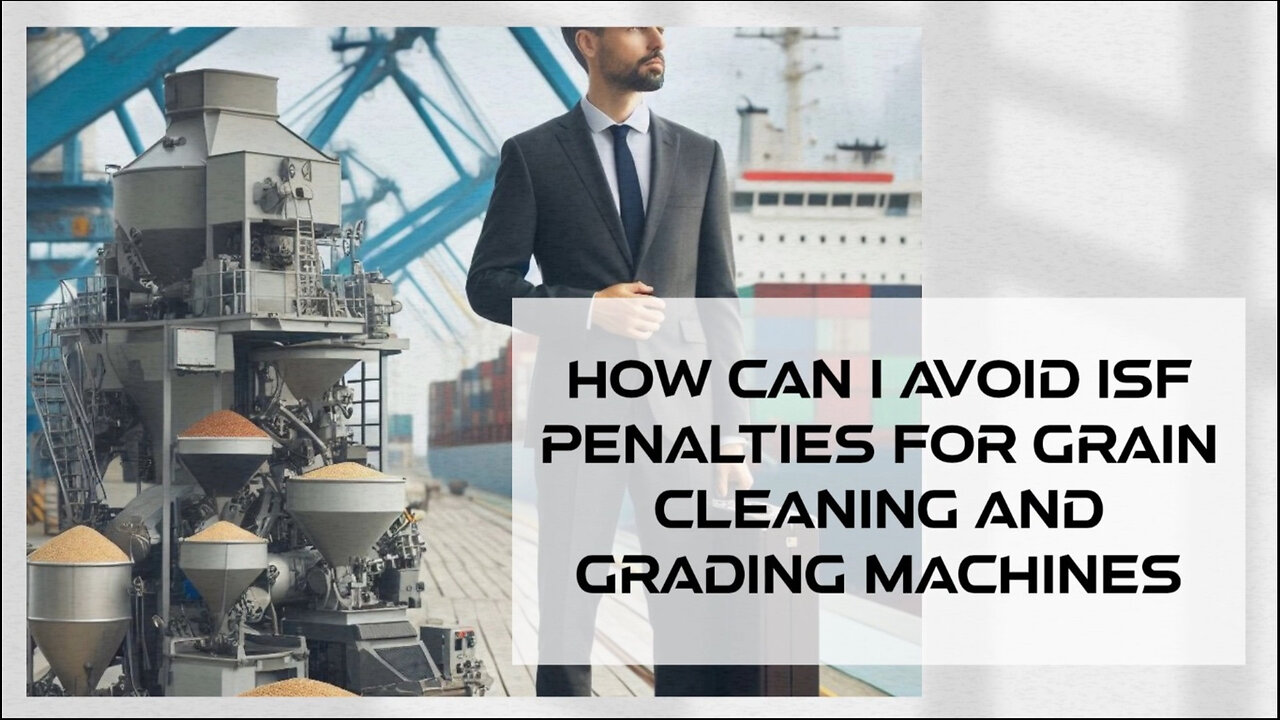Premium Only Content

Mastering ISF Compliance: Tips for Importing Grain Cleaning and Grading Machines
ISF Template | 562-453-7357 | isf@isftemplate.com | www.isftemplate.com
In today's video, we discussed the important topic of how to avoid ISF penalties for grain cleaning and grading machines. Importers of these machines need to understand the Importer Security Filing (ISF) requirements, accurately classify their machines under the Harmonized System (HS) codes, file the ISF in a timely manner, provide complete and accurate information in their filings, and have the appropriate customs bond coverage.
The ISF is a filing requirement implemented by US Customs and Border Protection (CBP) to enhance supply chain security. Importers or their agents must provide specific information about the imported goods, such as the Bill of Lading number and container stuffing location. Failure to comply with the ISF requirements can result in penalties and delays in goods release.
Accurate classification of grain cleaning and grading machines is crucial to ensure proper duty assessment and compliance with US customs laws. Importers should consult with experienced customs brokers or use online classification tools to determine the correct HS code for their machines. Incorrect classification can lead to penalties and additional costs.
Timing is another important factor in ISF compliance. The ISF must be filed no later than 24 hours before goods are loaded onto a vessel for shipment to the US, or at the time of departure for non-bulk cargo arriving by air. Importers should plan ahead and coordinate with overseas suppliers to obtain the necessary information for timely filing.
Providing complete and accurate information in ISF filings is essential. Importers should ensure all required data fields are correctly filled out, including buyer, seller, manufacturer, HTS codes, container stuffing location, and Consolidator (if applicable). Discrepancies or errors can lead to penalties, so it's important to double-check filings for accuracy.
Customs bonds are an integral part of the ISF process. Importers must have a continuous bond on file with the CBP to ensure payment of duties, taxes, and other charges related to imported goods. Working with a licensed customs broker can help importers obtain the appropriate bond coverage to meet their specific needs.
By following these steps - understanding ISF requirements, accurately classifying machines, filing ISF in a timely manner, providing complete and accurate information, and having the appropriate customs bond coverage - importers can minimize the risk of ISF penalties and ensure a smooth import process.
Thank you for watching, and remember to subscribe to our channel for more videos on customs brokerage and international trade topics.
#usimportbond #isfcustomsbroker #uscustomsclearing #isfentry
Video Disclaimer Here: This video is designed for education and is unaffiliated with US government bodies.
00:28 - Understanding ISF Requirements
01:11 - Accurate Classification
01:35 - Timely Filing
02:08 - Complete Information
02:41 - Importance of Customs Bonds
03:10 - Follow Compliance Steps
-
 2:09:26
2:09:26
Side Scrollers Podcast
17 hours agoSplitgate 2 Reverses Course, Ubisoft Failures, RIP Julian LeFay | Side Scrollers
68.5K3 -
 17:01
17:01
GritsGG
13 hours agoAttempting World Record Win Streak! 18 of 71!
3.71K1 -
 1:42:12
1:42:12
Omar Elattar
9 months agoDAN MARTELL: From 17-Year-Old In Jail To $100 Million Business Investor!
4.85K1 -
 LIVE
LIVE
Lofi Girl
2 years agoSynthwave Radio 🌌 - beats to chill/game to
221 watching -
 11:00
11:00
The Pascal Show
10 hours ago'SHE WOULD'VE KICKED YOUR F***ING A**!' Kaylee Goncalves Sister Victim Statement To Bryan Kohberger
8.45K2 -
 1:07:47
1:07:47
Dad Dojo Podcast
13 hours ago $0.36 earnedEP40: Conspiracies Revealed
5.97K1 -
 2:10:55
2:10:55
FreshandFit
10 hours agoAndrew Branca And Donovan Sharpe COOK Some Dumb Hoes!
182K95 -
 22:26
22:26
Liberty Hangout
11 hours agoAnti-Trumper Has Complete Meltdown
22K46 -
 2:21:24
2:21:24
Badlands Media
14 hours agoDevolution Power Hour Ep. 374: Declassified Intel, Trump’s Traps, and the Optics of Collapse
135K38 -
 2:00:38
2:00:38
Inverted World Live
8 hours agoWhite House Boosts the AI Revolution | Ep. 79
48K13